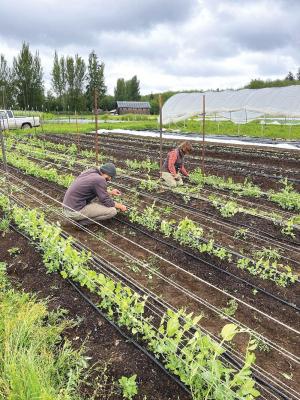Farm School Teaches Organic Business
 ✖  |
The Organic Farm School on Whidbey Island in Washington doesn’t offer accreditation. Instead, it focuses on teaching important lessons for a successful business in agriculture by offering practical experience in a broad range of skills needed for farming. Instead of paying tuition, students receive a stipend along with room and board during their February through Thanksgiving school year.
While the payment and the beautiful location are nice bonuses, Judy Feldman, the nonprofit school’s executive director, emphasizes students earn those benefits as they study and work at the 10-acre farm. To keep the working conditions realistic, class sizes are limited to about half a dozen.
While Feldman focuses on outreach to consumers and running the school, instructors and facilitators cover lessons and issues in agriculture. That includes vegetable crop and flower production, raising livestock (lamb and poultry) and processing poultry, seed production, bookkeeping, marketing, and much more.
As a certified organic farm, there’s plenty of labor required, such as hand weeding, tractor cultivation, and learning how to grow in high tunnels and set up irrigation, says farm manager Jeff Markette.
“We have some nice things like the high tunnel,” he says, but much of the operation is similar to what first-year farmers could afford.
“If something breaks, it’s a teaching opportunity,” Markette says. Irrigation needs to be moved around, and electrical lines and pipes need to be buried. Mechanics class focuses on changing oil and equipment maintenance.
Because the farm is certified organic, students learn the necessity of record keeping, which will benefit them in any type of farming they do, Markette says. Plus, organic certified products earn premium prices that are important for successful operations. Learning how to save organic open-pollinated dry seed (lettuce, radish, flowers, shelling peas, etc.) also provides an extra income source and optional crop for farmers as they get older.
“There’s a need for more small-scale farmers as quickly as possible,” Feldman says. Between local farms and connections the school has throughout the U.S. with former students, Organic Farm School graduates have many work opportunities.
“When they leave here, we don’t encourage them to get their own farm (right away),” she adds. Instead, they recommend new farmers get experience as they work for someone else, do an internship, or start with a small-scale farm while working a part-time job. Growing vegetables is generally the best way to start for success and then work into a specialty.
Contact: FARM SHOW Followup, Organic Farm School, 6390 Maxwelton Rd., Clinton, Wash. 98236 (ph 360-579-4989; judy@organicfarmschool.com; www.organicfarmschool.org).

Click here to download page story appeared in.
Click here to read entire issue
Farm School Teaches Organic Business SPECIALTY/SERVICES The Organic Farm School on Whidbey Island in Washington doesn’t offer accreditation Instead it focuses on teaching important lessons for a successful business in agriculture by offering practical experience in a broad range of skills needed for farming Instead of paying tuition students receive a stipend along with room and board during their February through Thanksgiving school year While the payment and the beautiful location are nice bonuses Judy Feldman the nonprofit school’s executive director emphasizes students earn those benefits as they study and work at the 10-acre farm To keep the working conditions realistic class sizes are limited to about half a dozen While Feldman focuses on outreach to consumers and running the school instructors and facilitators cover lessons and issues in agriculture That includes vegetable crop and flower production raising livestock lamb and poultry and processing poultry seed production bookkeeping marketing and much more As a certified organic farm there’s plenty of labor required such as hand weeding tractor cultivation and learning how to grow in high tunnels and set up irrigation says farm manager Jeff Markette “We have some nice things like the high tunnel ” he says but much of the operation is similar to what first-year farmers could afford “If something breaks it’s a teaching opportunity ” Markette says Irrigation needs to be moved around and electrical lines and pipes need to be buried Mechanics class focuses on changing oil and equipment maintenance Because the farm is certified organic students learn the necessity of record keeping which will benefit them in any type of farming they do Markette says Plus organic certified products earn premium prices that are important for successful operations Learning how to save organic open-pollinated dry seed lettuce radish flowers shelling peas etc also provides an extra income source and optional crop for farmers as they get older “There’s a need for more small-scale farmers as quickly as possible ” Feldman says Between local farms and connections the school has throughout the U S with former students Organic Farm School graduates have many work opportunities “When they leave here we don’t encourage them to get their own farm right away ” she adds Instead they recommend new farmers get experience as they work for someone else do an internship or start with a small-scale farm while working a part-time job Growing vegetables is generally the best way to start for success and then work into a specialty Contact: FARM SHOW Followup Organic Farm School 6390 Maxwelton Rd Clinton Wash 98236 ph 360-579-4989; judy@organicfarmschool com; www organicfarmschool org
To read the rest of this story, download this issue below or click
here to register with your account number.







